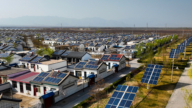【新唐人2013年07月04日訊】連日來,中國大陸出現的「錢荒」風波,熱度依然不減。日前,中宣部向各地媒體和地方宣傳部門下令,停止炒作「錢荒」的報導。分析指出,中國的錢荒,不再只是經濟的問題而已,已經上升到政治問題。如何解決問題?中共高層進退兩難。下面請隨本臺記者一起來看看專家的分析。
據英國《金融時報》記者發自上海的報導,中宣部上個星期已發出指示,要求報紙、電視臺、地方黨委宣傳部,下令所屬的記者停止「炒作所謂的錢荒」,同時,還要報導中國市場資金充裕的信息。
報導還說,中宣部官員定期就敏感政治議題向國家的媒體發出指引,說明避免用甚麼字、報導怎樣定調等,但是,像這次這樣對財經媒體下指令的做法,還是很罕見的。
而美國《彭博社》報導,中國銀行的盈利增長,已經被外界對新借貸被用於償還舊債的擔憂蒙上陰影,中國經濟急劇的放緩,可能觸發破產和違約。
報導指出,中國商業銀行的不良貸款已經連續六個季度攀升,這是九年來最長的上升曲線。不良貸款比一年前上升20%,在第一季度達到860億美元。
美國「南卡羅萊納大學」艾肯商學院教授謝田:「這個問題集中體現了中共的獨裁統治和中國人民老百姓的利益尖銳對立,這樣一個現實,這個問題是涉及到所有的人的,涉及到錢的問題,這個東西它想要繼續掩蓋也掩蓋不住了,實際上上海的同業利率飆升,他們是沒有辦法掩蓋的。」
《彭博社》的報導還說:中國工商銀行的股票和它的三大國內競爭者—-中國建設銀行,中國農業銀行和中國銀行,上個月在香港股市平均下跌12%,抹去了今年以來的漲幅。
專家預計,中國的信貸緊縮,貸款增長放緩將進一步拖累經濟。而這樣的擔憂讓一些全球投資者遠離中國銀行股票。
同時,美國《華爾街日報》(The Wall Street Journal)也在關注中國的「錢荒」問題。
報導說,大陸央行對銀行間市場的「錢荒」袖手旁觀,致使銀行間利率在過去兩週大幅飆升。6月24號,中國股市創出近四年來最大單日跌幅,拖累亞洲股市和大宗商品市場普遍走軟。不過《華爾街日報》看到一份內部會議資料顯示,央行面對信貸增長失控,已經沒有別的對策了。
謝田指出,如果中共想解決問題,也可能注入流動性資金,但數額需要在幾千億到上萬億的規模,才有可能解決。但是,相對來說,也會有負面的影響。
謝田:「如果他要在提供上萬億或者更多的資金進入金融體系,實際上原來的問題就會一直加劇,直到中國資產泡沫化,基礎建設失控,信貸過度,問題肯定是火上澆油, 如果不注入資金讓錢荒繼續下去,一定會帶動金融企業、銀行業大規模的破產,所以中共確實處於一種進退兩難的境地。」
謝田認為,中國的「錢荒」,已經不單單只是經濟問題了,「錢荒」已經變質,並上升為一個政治問題,和社會問題。
謝田:「實際上它(錢荒)揭示了中國經濟裡邊最關鍵的問題,就是中國既得利益集團和中國百姓利益對立的問題,就是中國的財富從百姓手中,被竊取到,集中到權貴利益集團手中,這就是一個政治問題,它涉及到中國的政治體制的問題,中國共產黨正是因為有它的專制、獨裁的力量,才可以把錢掌控在自己手中,才造成現在的經濟的問題。」
有分析指出,雖然中宣部下令各媒體,停止對「錢荒」的報導。但是,常言道:「紙包不住火」,那麼,中國老百姓的錢,是否不再被專權者盤剝利用,我們將繼續關注。
採訪編輯/常春 後製/李勇
Experts: China’s Credit Crunch is a Political Problem
Recently, China’s bank “cash shortage"has continued.
The Chinese Communist Party’s (CCP) Central Propaganda
Department (CPD) had sent an order to media and local CPD.
It instructed them to stop hyping up the shortage of cash.
Analysts said that China’s credit crunch is no longer an
economic problem, but a political problem.
How can this problem be resolved?
This is the dilemma for the CCP top leaders.
Let’s take a look what the experts say.
The Financial Times (FT) reported in Shanghai that
the CPD issued orders last week.
It instructed journalists of newspapers, TV stations and
local CPD to stop “hyping up"the so called cash crunch.
Instead, they need to spread the message that
China’s markets are well stocked with money.
The FT revealed that the CPD regularly sends
guidelines to media about sensitive political subjects,
and advises which words to avoid,
and how to frame their reporting.
However, it is rare for such instructions
to be sent to Financial media.
Bloomberg reported that the growth of Chinese banks’
earnings have been overshadowed by concerns that
new lending is being used to repay older debt,
and that a sharper slowdown in the economy
may trigger bankruptcies and defaults.
The report said that bad loans at China’s commercial
lenders have already climbed for six straight quarters.
It is the longest streak in at least nine years.
Non-performing loans rose 20% from a year earlier
to end of the first quarter to $86 billion.
Xie Tian, a professor at the Aiken School of Business
at the University of South Carolina:"This problem
epitomizes a reality of sharp opposition between
the CCP’s dictatorship and the Chinese people.
This problem is related to all people and involves money.
This problem can’t be hidden any more.
In fact, the Shanghai interbank interest rates have risen,
there is no way to cover it up."
Bloomberg said: Shares of Industrial & Commercial
Bank of China and its three largest local competitors –
China Construction Bank, Agricultural Bank and Bank of
China fell by an average of 12% in Hong Kong last month.
It erased all of this year’s gains.
Experts predict that China’s credit crunch, and loan
growth slowdown will further drag down the economy.
Such concerns can push away some global investors
from Chinese bank shares.
The Wall Street Journal (WSJ) is also concerned
about China’s credit crunch.
The WSJ reported that China’s Central Bank felt that
it has no way to solve the problem of cash shortage which
has catapulted interest rates to nose-bleeding highs,
during the past two weeks.
On 24th June, Chinese stocks posted their
worst one-day loss in nearly four years.
It contributed to a broad regional decline
in equities and commodity markets.
WSJ revealed data from an internal meeting
at China’s Central Bank.
It shows that the central bank had no way to deal with
what it saw as out-of-control credit growth.
Xie Tian pointed out that if the CCP wants to solve the
problem, it may have to possibly inject liquidity.
But, the amount required would require
several hundreds of billions to several trillions
to have the possibility of resolving the problem.
However, relatively speaking, it will bring a negative effect.
Xie Tian: “If several trillions or more in funds
are injected into the financial system,
the previous problem would be intensified
until the Chinese assets’bubble burst.
The infrastructure will lose control, credit will
become excessive, the problem has certainly been stoked.
If the situation remains unfunded the money shortage
will continue without injection of funds,
it will trigger the financial industry and banks
to collapse on a large-scale.
Thus, the CCP finds itself in a dilemma."
Xie Tian believes that the cash shortage isn’t only an
economic problem, it has transformed into political and social problems.
Xie Tian:"Actually, China’s credit crunch
revealed a critical issue, that is,
the interest groups oppose the Chinese people.
That means China’s wealth was stolen from the civilians.
It gathered into the hands of privileged groups,
this is a political issue.
It relates to the problem of China’s political system.
The CCP has dictatorial power, they can control the money in
their hands, and have caused the current economic problems."
Analysts say that although the CPD instructed
media to stop with the reporting of the credit crunch,
nevertheless it cannot be covered up.
Whether the Chinese people’s money can be
exploited or not, we will see.



























